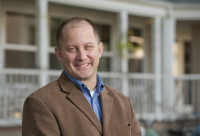On this episode of “School’s In,” the director of the Haas Center for Public Service at Stanford talks about engaging students through service.

Tom Schnaubelt talks about the benefits and challenges of service learning on this episode of "School's In."
How can educators and parents help students get the most value from serving their community? Tom Schnaubelt, executive director of the Haas Center for Public Service at Stanford, joined Graduate School of Education Dean Dan Schwartz and Senior Lecturer Denise Pope on this episode of School’s In to talk about how service learning differs from community service, and the benefits students get from combining service and scholarship.
Listen to the full episode at the link below, and find more episodes at Stanford Radio. School’s In airs weekends on SiriusXM Insight channel 121.
Interview highlights
Service vs. service learning
Service learning is not service as a standalone thing. It's actually fundamentally integrated into the course. [There are] engineering courses where people are learning mechanical engineering by building assistive technologies for people who have mobility problems. It's completing the learning cycle, right? We know how people learn. It's not just from abstract conceptualization about problems. It's really about figuring out “I'm going to actually have an experience and then reflect on that and come back to the abstract conceptualization.” That’s one of the ways that I think service is different from service learning.
Mental health benefits of service
There's another side of service that I try to elevate a little bit more. There's some research out there about how student mental health is actually enhanced by creating these opportunities for students to give and to serve and to be engaged in the community, because they're making meaning. We know that people who are involved with their peers making meaning actually have better mental health outcomes. They have this sense of belonging to something that's larger than themselves. I'm not saying that this is a panacea for mental health issues, but that's actually a really important thing that I think we don't talk enough about: The ability for this kind of learning and this kind of work to help create that sense of belongingness is going to make them more healthy in the long run.
Thinking deeply about service
If I could do one thing around these service requirements, I would strip away the hourly requirement and focus on having some set of competencies or some reflection essay asking students to focus on the ethical challenges [they] faced in doing service. I’ve asked this question. I'm also a resident fellow at one of the dorms on campus that happens to be the public service theme dorm. In our entrance essay we asked students to write about an ethical dilemma that they've encountered through service. I'm actually quite surprised by how often students have a challenge coming up with that, which really tells me that they're not doing service the way I want them to. They’re stocking cans, they’re licking stamps. They're not really faced with, “Hey, this is a challenge that I need to internalize and think about.”